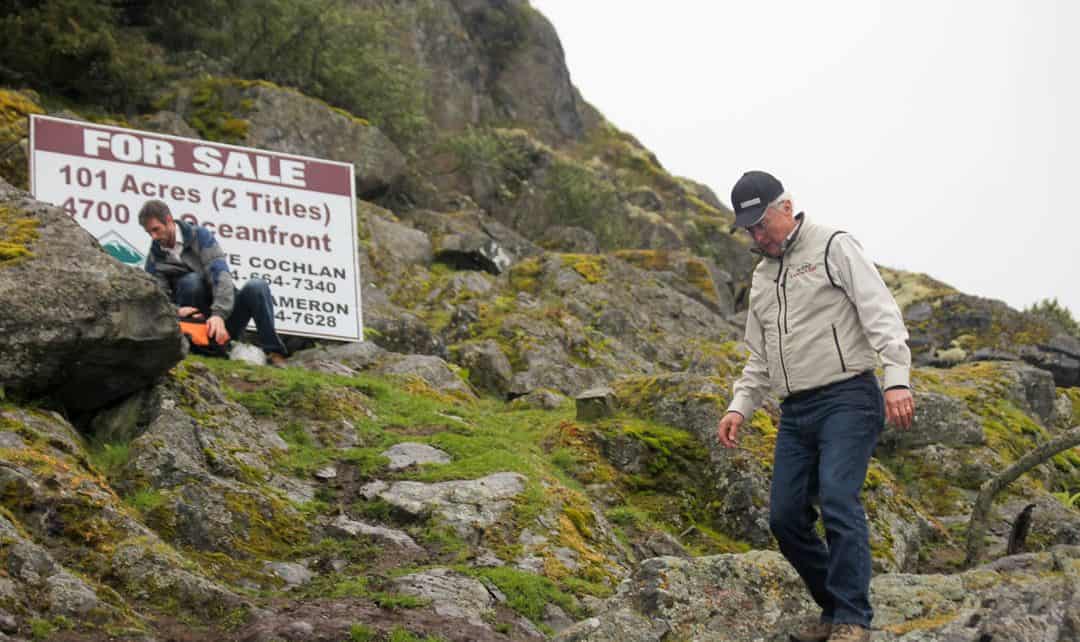Imagine having to show real estate properties via boat, plane, ATV, horse, snowmobile, raft or helicopter. That is a daily occurrence for the team at LandQuest Realty based in New Westminster, B.C.
Company president Richard Osborne started the brokerage two decades ago when he realized how challenging it would be if someone wanted to buy a remote cottage in B.C. Seeing that it could take a couple of years to view all the cottages in a desired buying area due to having to go through so many real estate agencies, he started his own company. LandQuest specializes in hard-to-reach properties. “Our folks go where others don’t, the really remote stuff like mineral claims on the tops of mountains in the Kootenays,” says Osborne. One of his favourite showings was the Moose Lake Lodge in the West Chilcotin area of B.C. He flew in with famed bush pilot John Blackwell in a Found aircraft on skis in the wintertime.
Selling remote properties isn’t for everyone. A typical day can have you driving 10 hours to show a place. In some cases, it’s a 10-hour trek each way, resulting in a two-day excursion to show one property. And once the driving part is done, another form of transportation usually takes over.
For the LandQuest team it is often helicopters and ATVs but they also commonly use rafts, floatplanes and skis. “It makes for fun and life-threatening situations,” Osborne says. “The cool part is being out there doing it. We have a group of real estate adventurers that trip around B.C. They ski, ride horses, fly airplanes, drive boats, show a property and then pull pond traps for crab on their way home.”
Safety can be an issue when visiting such remote places, although Osborne contends that it’s more dangerous driving the Alex Fraser Bridge in the Greater Vancouver area than viewing secluded properties. All of the women on the LandQuest team have inReach GPS devices so they can phone or text from anywhere on the planet if they get in trouble; all the men on the team will have the devices shortly.
Osborne says that putting a price tag on a remote property is one of the biggest challenges. “It’s not like having a house in a subdivision where every other house only has minor changes. These are remote properties with very little to compare them to. Finding ways to unlock all of the value of a property is tough. Like if there is timber or a gravel pit on the property. It’s not a condo in town with a lockbox on the door. Figuring out the value takes the expertise of many, many years of doing this to tell people what the properties are actually worth. An island in the middle of the lake is very difficult to put a dollar value on.”
Fawn Gunderson is a LandQuest agent who resides and specializes in the Bella Coola area of British Columbia. I caught up with Gunderson as she was heading out to show a property that was two hours down the highway, on to a dirt road for an hour and then another 40 minutes off road on a 4×4. The real estate agent carries a chainsaw in her vehicle – you never know when trees will be down that you have to cut away for access – as well as a knife and bear spray. She loves her job – “it’s different every day” – and feels that anyone who shows such remote properties has to love the outdoors. “It’s fun to sell this stuff as everyone you take is wowed by the properties they see.”
Gunderson talks about her typical listings: “Many properties are 4×4 access only so I use a snowmobile in the winter and a four wheeler or a side-by-side in the spring to show it. I have properties in Ocean Falls that are boat access only. We have remote cabins on lakes where you drive through cut blocks into the bush in the middle of nowhere and all of a sudden there is a home on a lake. Viewing the properties when you finally get there is the exciting part. We aren’t selling people a home, mainly we are selling them a lifestyle.”
Marketing remote properties isn’t an easy task; you are looking for a very specific buyer. Osborne’s marketing strategy involves extensive print advertising in a wide range of publications including The National Post, Pacific Yachting, Western Investor and B.C. Outdoors. But the greatest marketing tool is their website, which 2,000 people a day visit. Its reach has extended to over 190 countries and 7,000 cities around the globe in the past 12 months alone. Their goal of marketing B.C. to the world has been achieved.
As for the downsides to selling remote properties, Gunderson says that it can be tough for people used to getting home inspections to accept that the properties may not be built to code.
“Often there are solar systems, plants are watered with grey water from the sink and septic isn’t certified. Another downside is that because the properties are hard to get to and from, sometimes it’s really hard to get financing.”
Another of Osborne’s fondest experiences involves taking clients to see a property on the Queen Charlotte Islands; the secluded property can only be accessed by driving up the beach. “You don’t want to do that trip by yourself. If you break down, the tide will eat your car.”
Toby Welch is a contributing writer for REM.














